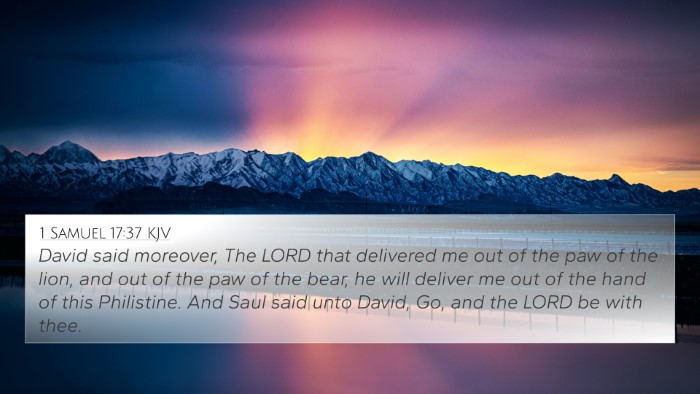Understanding Joshua 10:25
Joshua 10:25 states:
"And Joshua said to them, 'Do not be afraid or dismayed! Be strong and of good courage, for thus the Lord will do to all your enemies against whom you fight.'" (ESV)
Summary and Analysis
This verse occurs within the context of Israel’s conquest of the Promised Land, where Joshua encourages his soldiers after an intense battle. The sentiment expressed reflects a theme of divine support and courage in the face of adversity.
Key Themes
- Divine Assurance: The Lord's promises are emphasized, portraying a God who fortifies and sustains His people.
- Courage in Battle: Encouragement to remain steadfast despite overwhelming odds is central to this verse.
- Victory Through Faith: The assurance that God will defeat their enemies correlates with the overarching narrative of dependence on divine strength.
Commentary Insights
Various commentators provide insights into this powerful verse:
Matthew Henry: Highlights the necessity of courage in both physical and spiritual battles. He points out that Joshua’s words serve as a potent reminder that God's presence is crucial in overcoming fears.
Albert Barnes: Emphasizes that this command to be strong comes from the Lord's covenant relationship with His people. The promise of victory not only reassures Israel but acts as a motivational tool for the troops.
Adam Clarke: Discusses the importance of reassurance in leadership. He notes that Joshua’s encouragement reflects God’s compassion, providing strength to those who might waver in their resolve.
Cross-References
This verse has various connections with other scriptures that underscore its themes of courage and divine assistance:
- Deuteronomy 31:6: "Be strong and courageous. Do not fear or be in dread of them, for it is the Lord your God who goes with you. He will not leave you or forsake you."
- Isaiah 41:10: "Fear not, for I am with you; be not dismayed, for I am your God; I will strengthen you, I will help you, I will uphold you with my righteous right hand."
- Philippians 4:13: "I can do all things through him who strengthens me."
- 2 Timothy 1:7: "For God gave us a spirit not of fear but of power and love and self-control."
- Romans 8:31: "What then shall we say to these things? If God is for us, who can be against us?"
- Psalms 27:1: "The Lord is my light and my salvation; whom shall I fear? The Lord is the stronghold of my life; of whom shall I be afraid?"
- Joshua 1:9: "Have I not commanded you? Be strong and courageous. Do not be frightened, and do not be dismayed, for the Lord your God is with you wherever you go."
- Hebrews 13:6: "So we can confidently say, 'The Lord is my helper; I will not fear; what can man do to me?'"
- 1 Corinthians 15:57: "But thanks be to God, who gives us the victory through our Lord Jesus Christ."
- Exodus 14:14: "The Lord will fight for you, and you have only to be silent."
Thematic Connections
The connections between these Bible verses enhance the understanding of Joshua 10:25, illustrating the broader Biblical theme of faith, courage, and divine protection. This inter-Biblical dialogue highlights how the Old Testament influences the New Testament understanding of God’s promises.
Tools for Further Study
For further understanding, you may explore:
- Bible Concordance: A resource for finding where specific themes are discussed across various scriptures.
- Bible Cross-Reference Guide: Tools that help in linking related verses to create a comprehensive understanding.
- Cross-Reference Bible Study Methods: Techniques to analyze the connections between verses effectively.
- Bible Reference Resources: Assets to aid in deeper study of scripture themes.
- Comprehensive Bible Cross-Reference Materials: Collections of scriptures to facilitate detailed comparative studies.
Conclusion
In Joshua 10:25, we find an essential message of courage backed by divine assurance. The verse serves as a source of strength not only for the Israelites but also for believers today. By examining cross-references and contextual connections, one can appreciate the depth of scripture and its relevance in contemporary faith.













